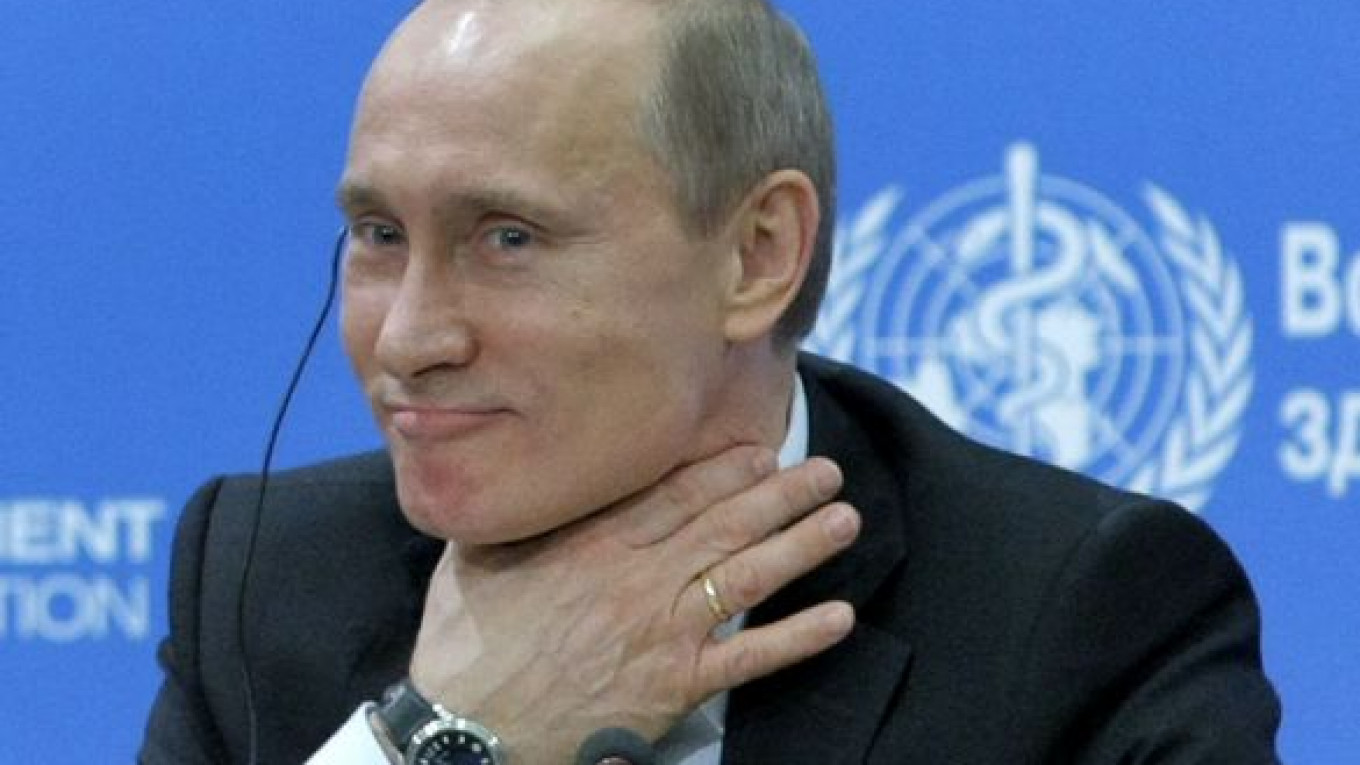For Prime Minister Vladimir Putin, the United States is a "parasite" because its rising debt weighs on the global economy. For his government, the same debt is the safest possible investment.
The country has boosted its holdings of U.S. debt by more than 1,600 percent since September 2006, according to U.S. Treasury Department data. Russia used surging commodity prices to build the world's third-largest reserves pile, boosted in part by returns on Treasuries.
Putin, 58, who oversaw the largest buildup of U.S. debt holdings in Russia's history as president from 2000 to 2008, may return to the post after elections next year. The country is now one of the world's 10 largest holders of the securities with $110 billion at the end of June, about 70 percent more than when Putin left the Kremlin.
"They are sending out a message" largely for domestic consumption, Edwin Gutierrez, who helps manage about $7 billion in emerging market debt at Aberdeen Asset Management in London, said last week. "It's ironic that these voices of complaint come as they experience massive capital appreciation."
Russia's 2020-dollar bonds returned 9.5 percent this year compared with 12.7 percent for similar-maturity U.S. debt. This month, the Russian dollar bonds advanced 0.7 percent against a 5.6 percent increase for U.S. bonds. Ten-year Treasury yields dropped below two percent for the first time yesterday, touching a record-low 1.9735 percent before rising again.
The yield on 10-year U.S. Treasuries has fallen 2.77 percentage points, or 277 basis points, over the past five years, according to data compiled by Bloomberg. The yield on U.S. Treasuries due in 2016 has fallen 110 basis points this year — almost double the 66 basis-point drop for comparable German bunds.
The American bond market has outperformed world bond indexes since Standard & Poor's downgraded the U.S. credit rating on Aug. 5, showing no increase in market concern that the nation could default. Moody's Investors Service and Fitch Ratings, the two next biggest rating companies, affirmed their AAA ratings on the United States.
S&P's first downgrade of U.S. debt to AA+ sparked a global sell-off in equities as investors sought shelter in traditional havens like Treasuries. The Securities and Exchange Commission is scrutinizing the decision.
The United States "is living beyond its means and shifting part of the weight of its problems onto the world economy, acting to some extent as a parasite on the global economy and its dollar monopoly position," Putin told a youth camp outside Moscow on Aug. 1 in response to questions about the risk of an American default.
After the S&P downgrade, Russia joined the largest holders of U.S. debt in rushing to voice support by pledging to retain their Treasuries holdings.
Russia does not expect "any alternative whatsoever" to American sovereign debt in its holdings for the next five years, Deputy Finance Minister Sergei Storchak said last week.
"The U.S. debt market is still the most liquid, dependable and safe," Storchak said. "There's absolutely no reason for Russia to reconsider its position on U.S. securities or to change its investment strategy now. And not just now — for some time to come."
Even after reducing holdings 38 percent from an October 2010 peak of $176 billion, Russia's $110 billion in U.S. Treasuries at the end of June accounted for 21 percent of its international reserves and gold holdings, up from 17 percent when the foreign-exchange stockpile peaked in August 2008.
The country's holdings of U.S. Treasuries have expanded in the last five years as soaring oil revenue boosted the reserves of the world's largest crude producer. Urals crude oil, the country's main export blend, has almost doubled in price to $106.10 a barrel from $54.44 over the same period.
"As long as the dollar remains the main currency in which the Central Bank tracks reserves and raw material companies receive their revenue, Russia really doesn't have any alternatives," Oleg Vyugin, chairman at Moscow-based MDM Bank and a former first deputy chairman of the Central Bank, said in a phone interview Aug. 17. "The Federal Reserve system is the center of global liquidity."
For now, instruments denominated in dollars and euros represent the “two truly liquid markets,” said Central Bank first deputy chairman Alexei Ulyukayev. “We’re going to work on this, but unfortunately there’s no reason to expect any significant changes.”
A Message from The Moscow Times:
Dear readers,
We are facing unprecedented challenges. Russia's Prosecutor General's Office has designated The Moscow Times as an "undesirable" organization, criminalizing our work and putting our staff at risk of prosecution. This follows our earlier unjust labeling as a "foreign agent."
These actions are direct attempts to silence independent journalism in Russia. The authorities claim our work "discredits the decisions of the Russian leadership." We see things differently: we strive to provide accurate, unbiased reporting on Russia.
We, the journalists of The Moscow Times, refuse to be silenced. But to continue our work, we need your help.
Your support, no matter how small, makes a world of difference. If you can, please support us monthly starting from just $2. It's quick to set up, and every contribution makes a significant impact.
By supporting The Moscow Times, you're defending open, independent journalism in the face of repression. Thank you for standing with us.
Remind me later.






